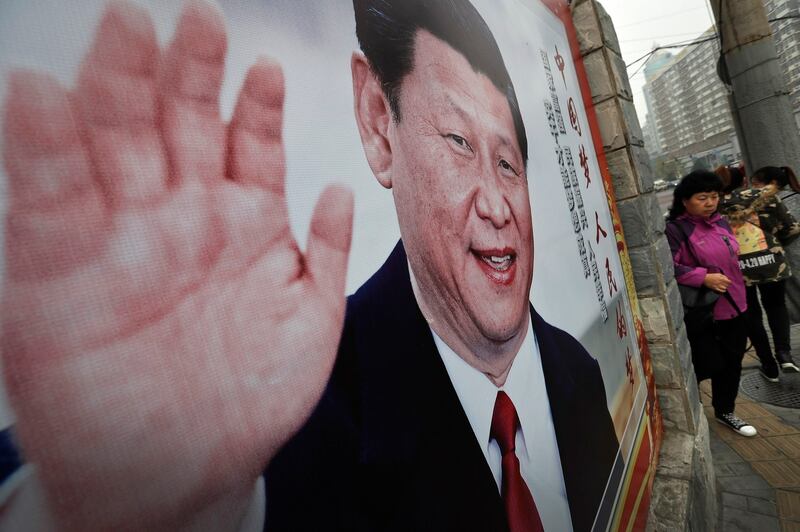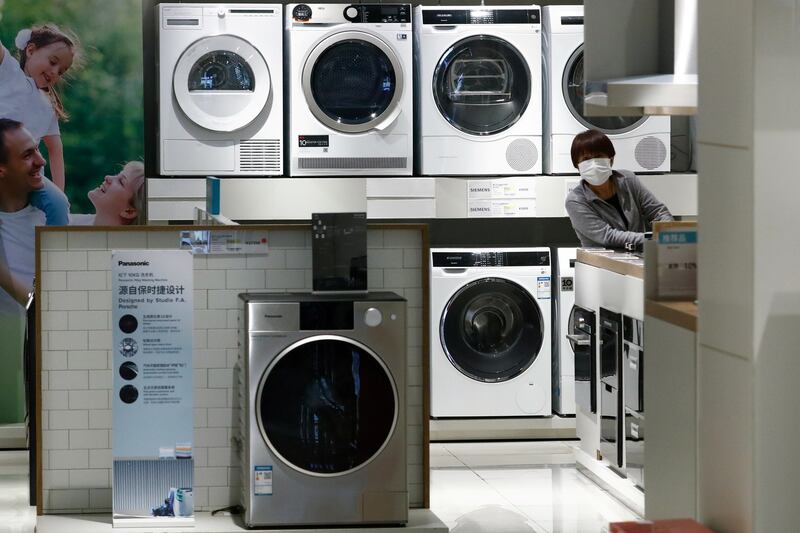Beijing is countering reports of deepening structural problems and economic hardship with articles in state media about how the long-term outlook is positive as measures begin to pay off.
In the latest of such efforts, a commentary in the Chinese Communist Party mouthpiece Guangming Daily headlined “Smearing the East won’t deter its rise or prevent the downward trend of the West,” argued that although the United States’ proportion of the world’s GDP increased in 2023 as China’s shrank, it does not mean that the Chinese economic outlook is bleak or that the pattern of a “rising East and declining West” will stop.
Zhang Yongjun, deputy chief economist of the China Center for International Economic Exchanges, who wrote the commentary pointed out that China's economic growth of 5.2% last year was more than double the U.S.’s 2.5%. Furthermore, the Chinese currency’s depreciation against the dollar and falling prices versus America’s inflation and stronger currency were causal factors of a contracted GDP contribution.
The Chinese economy is expanding at its slowest pace since 1990 when it grew at 3.9%.
Wang Ruiqin, an entrepreneur and former member of the Qinghai Chinese People’s Political Consultative Conference (CPPCC), a political advisory body to the Chinese Communist Party dismissed the article as “pure propaganda to drum up support for the CCP.”
“No one in China reads this [Guangming Daily],” Wang said in an interview with Radio Free Asia, adding that Zhang’s China Center for International Economic Exchanges is controlled by the National Development and Reform Commision and established by former Vice Premier Zeng Peiyan. Based on the background, “Zhang Yongjun is likely an official in the name of a scholar.”
The “rising East and declining West” concept was raised by President Xi Jinping in 2021 as the “most prominent” in “today’s world which is undergoing major changes unseen in a century.” Xi said then that the COVID-19 pandemic further pressured the recovering but weak global economy, and amplified “criticisms of Western capitalism.” However, when Beijing made an about-turn in its zero-COVID policy, leaving the economy to fall off a cliff, observers began to question whether the “declining West” theory was far from reality.

According to Xia Ming, a political science professor at the City University of New York in the U.S., in the 1950s Mao Zedong had also viewed the world as one where “the east wind prevails over the west wind.”
But Xia said he believes there is a limit to how much such vague political concepts can be used to cover up economic activities involving foreign capital in China or the outbound investments of Chinese companies abroad.
All about the economy
Economic issues are expected to dominate when China’s parliament, the National People’s Congress, and the CPPCC (known as the two sessions) meet in Beijing next week.
The Central Commission for Financial and Economic Affairs and the State Council executive meetings held on the eve of the two sessions discussed new economic measures in place of old ones to boost demand for equipment and consumer goods while calling for efforts to stabilize foreign investments.
Xi, who chaired the Central Commission meeting, advocated for a new wave of large-scale upgrades among Chinese firms, and consumers trading-in old equipment such as cars and home appliances to boost domestic demand and raise the overall development threshold.

Cheng Cheng-Ping, a finance professor at Taiwan’s National Yunlin University of Science and Technology said the upgrade proposal is to address the deflation problem and comes as previous multi-pronged measures like lowering reserve requirements and interest rates failed to stimulate demand.
“Out of the few carriages that can drive China's economic growth, the most powerful ones are either government spending or private consumption. The meeting also addresses the supply side. Demand for large machines and equipment for replacement will stimulate production, allowing state-owned enterprises to catch up in terms of productivity. He [Xi] also hopes to drive a new wave of private consumption.”
But amid Beijing’s policy of advancement of state enterprises and the retreat of the private sector, Cheng wondered about the sustainability of private firms.
“How many private firms can keep up and how strong can they be? There’s no way [we can] be too optimistic.”
Out of options
U.S.-based economist Cheng Xiaonong sees the proposal as a last-ditch measure.
“It seems that as long as he gives an order, all companies will replace equipment, and then the economy seems to be able to survive for a while. The problem is that if manufacturing companies really obey these orders, wouldn’t they chalk up bank loans?
“Using administrative orders to promote the economy or forcefully pull the economy is not workable. It just means that he can’t find any useful methods, so he comes up with these very stupid ideas. Such an approach shows that the CCP is desperate and has no other options.”
Cheng Xiaonong also pointed out the difference between this upgrading wave and the measure implemented by former Premier Wen Jiabao who urged Chinese consumers in the countryside to replace their old appliances with new ones.
At the time, there was a real demand in the rural areas, compared with a lack of orders now for new consumer goods.
Separately, at the State Council meeting, Premier Li Qiang emphasized the importance of ensuring a stable flow of foreign investment into the country, and claimed that the authorities’ efforts to resolve local debt problems were working.
Translated by RFA staff. Edited by Mike Firn and Taejun Kang.
